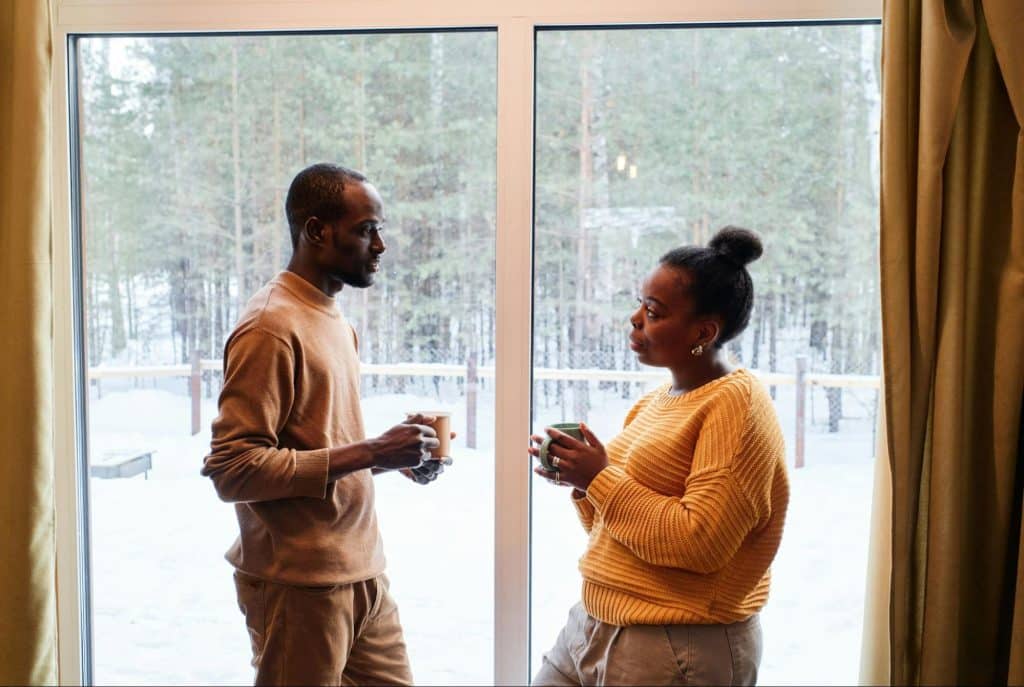
It often begins with love. He checks in, wants to make sure you’re safe, offers advice, and calls it care. But over time, those gestures start carrying rules, expectations, and conditions. Concern becomes control, and love starts to feel like permission. Control doesn’t shout; it whispers through boundaries that tighten slowly. True care brings peace, control brings pressure that feels like protection until it’s suffocating.
He Needs to Approve Everything You Do

It starts small, a question about where you’re going, who you’re with, or what you’re wearing. At first, it sounds like care, but it quietly shifts into monitoring. You begin feeling watched, not supported. When your choices start needing validation, care has crossed the line into control. Genuine love celebrates autonomy; possessiveness disguises fear as guidance.
He Uses “Worry” as a Reason to Interfere

He says he worries about you, and it sounds sincere. But soon, that worry becomes a tool, an excuse to intervene in your decisions. Every action you take gets filtered through his anxiety. Worry without trust isn’t care; it’s control covered in concern. Real love protects without policing.
He Monitors Your Social Life in the Name of Love

He wants to know where you are, who you’re with, and why. It’s not that he doesn’t trust you, it’s that he doesn’t trust anyone else. What feels like protectiveness slowly turns into surveillance. The phone checks, the constant questions, the subtle guilt when you spend time elsewhere, they’re all red flags. Love doesn’t track; it trusts.
He Decides What’s “Best” for You Without Asking

He starts making choices for you, what to do, who to avoid, even how to think. It sounds like leadership, but it’s actually control in disguise. Care that excludes your opinion isn’t love; it’s possession. Advice becomes authority when your voice stops mattering. Genuine care collaborates, it doesn’t command.
He Gets Upset When You Want Independence

He interprets your autonomy as distance. Every time you do something alone, he feels rejected. What he calls closeness is really dependence. Love doesn’t fear independence, it thrives because of it. When one person feels threatened by your freedom, it’s not partnership; it’s ownership.
He Frames Jealousy as Proof of Love

He calls it passion, says it’s because he cares so much. But jealousy isn’t love, it’s insecurity that demands control. The constant questioning, the side comments, the possessive body language, they’re signs of fear, not affection. Real love isn’t territorial; it’s trusting. The moment jealousy becomes proof of devotion, it’s already turned toxic.
He Keeps Score of How Much He Cares vs. You Do

He begins comparing effort, who texts more, who sacrifices more, who tries harder. Care becomes currency, used to measure control. Relationships aren’t competitions; they’re collaborations. Love that counts effort misses its purpose entirely. When giving becomes a scoreboard, connection turns conditional.
He Uses “I Know You Better Than You Know Yourself” to Dismiss You

It sounds flattering, like he understands you deeply. But that statement erases your agency. Over time, it becomes a weapon that invalidates your feelings. He stops listening because he assumes he already knows. Real understanding never silences, it listens, even when it disagrees.
He Needs Constant Reassurance of His Place

What begins as vulnerability turns into dependence. He constantly asks if you still love him, if you’re happy, if you’re planning to stay. The reassurance he craves becomes emotional labor you carry. Real love doesn’t demand constant proof, it rests in trust. When affection feels like performance, peace disappears.
He Gets Defensive When You Set Boundaries

Boundaries feel like rejection to someone who equates control with closeness. Instead of respecting your space, he takes it personally. He argues, guilt-trips, or minimizes your limits. But boundaries aren’t barriers, they’re expressions of self-respect. A man who resists them doesn’t protect your comfort; he protects his control.
He Gives You Guilt Instead of Space

When you ask for time alone, he reacts with hurt instead of understanding. His disappointment feels heavy, forcing you to choose between peace and guilt. Space becomes something you have to earn. But healthy love knows that distance strengthens closeness. Guilt is not proof of care, it’s evidence of control.
He Makes You Second-Guess Your Choices

He frames his opinions as “just concern,” but they leave you doubting yourself. You start overexplaining every decision just to avoid criticism. Slowly, you stop trusting your own judgment. Control doesn’t always dominate; sometimes it manipulates subtly. Love should build confidence, not dismantle it.
You Start Feeling Responsible for His Emotions

You begin managing his moods like they’re part of your duty. If he’s upset, you fix it; if he’s quiet, you walk on eggshells. Love becomes an emotional balancing act. But carrying someone’s peace shouldn’t be your burden. Real love doesn’t assign responsibility for another person’s happiness, it shares it.
He Mistakes Compliance for Connection

He believes things are fine because you no longer argue. But silence isn’t peace, it’s surrender. When one person stops expressing themselves, it’s not harmony; it’s fear of reaction. Love that requires silence to survive has already turned into control.
He Uses Care as Currency for Control

Every act of kindness comes with an invisible debt. The things he does “for you” become reasons to expect obedience. Gratitude becomes an obligation. Care that demands repayment isn’t generosity, its manipulation. Real love gives freely and trusts freedom in return.
He Becomes the Judge of What’s “Respectful” or “Appropriate”

He starts deciding what’s acceptable for you, who you talk to, what you wear, how you express yourself. It’s disguised as standards, but it’s really regulation. Respect is mutual, not imposed. When one person becomes the rule-maker, equality disappears.
He Calls It Protection, But It’s Possession

Control often wears the mask of protection. “I’m just keeping you safe” becomes the excuse for limiting freedom. But protection shouldn’t restrict; it should reassure. Love that confines isn’t care, it’s fear disguised as safety. Real love protects without taking away power.
He Confuses Leadership With Power

Some men believe leading means deciding, but real leadership listens, supports, and builds, not commands. Power creates distance; partnership creates balance. When he stops collaborating, care becomes coercion. True strength in love isn’t dominance, it’s emotional intelligence.
He Believes Love Means Ownership

He measures love by control, by how much access he has, how much influence he holds. But love isn’t about possession; it’s about presence. Ownership replaces freedom with fear. Real care never claims, it respects. The more you control someone, the less they feel loved.
When Love Finally Learns to Let Go

Control is never about strength, it’s about fear. Many men confuse protection with power because they were taught that love means responsibility over, not respect for. But care that controls only teaches people to hide who they are. Love can’t thrive in fear; it breathes only in freedom. When control ends, love finally has space to grow, not as ownership, but as understanding.






Ask Me Anything